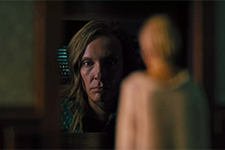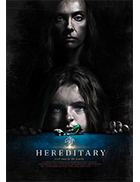Hereditary
|  Hereditary, Ari Aster’s feature directorial debut, is a seething supernatural psychodrama that takes most of its cues from the second golden era of American horror—namely, the late 1960s and early 1970s—but remains uniquely its own. It is, along with Jennifer Kent’s The Babadook (2014), David Robert Mitchell’s It Follows (2014), Robert Eggers’s The Witch (2015), and Jordan Peele’s Get Out (2017), one of the best modern horror films—the beginnings of a third golden era, it seems—because it merges a deeply unsettling sense of the horrific with compelling human drama. The horrors are that much more horrible because they emerge from and intensify a chamber drama of family conflict that would be gripping in and of itself. The horror, in other words, has real meaning. The majority of the story unfolds in and around a large house in the country that is home to the Graham family. Annie, the wife and mother (Toni Collette), is a celebrated artist whose chosen medium is autobiographical miniature dioramas, and she is deep at work on a new collection that is set to debut at an art gallery in six months. Her husband, Steve (Gabriel Byrne), is the gentle, steady type, a rock onto which Annie, who has endured a long and difficult relationship with her recently deceased mother, can hold tight. They have a teenage son, Peter (Alex Wolff), who is into chasing girls and smoking pot, and a younger teen daughter named Charlie (Milly Shapiro). Peter is a rather typical late-stage teenager, while Charlie is a bit different. No one ever says anything, but her general appearance and oddly anti-social demeanor suggest some kind of genetic condition. The film opens with an obituary for Annie’s mother, which is followed by the funeral in which Annie gives a strained eulogy that emphasizes her mother’s secrecy and interpersonal difficulty. Later, at a support group, Annie lets loose her tortured family history, which is rife with mental illness, suicide, and conflict. Building from Hitchcock’s Psycho (1960), Hereditary suggests in no uncertain terms that home is where the horror is. Thus, when a particularly grisly and unexpected tragedy strikes the Graham family, it is both utterly shocking and somehow almost expected, as if the tortured nature of Annie’s familial history has preordained the continued cascade of tragedy. At this point, Aster, who also wrote the screenplay, has treated the material in a largely straightforward manner, hinting at the possible presence of the supernatural, but focusing intently on the characters’ material existence and emotional worlds. The scene in which Annie is reduced to a howling rage of sorrow and pain, crying over and over again that she simply wants to die, is horrific in its naked display of emotional devastation, which is what makes the later supernatural incursions that much more powerful: they emerge in response to the tragedy, not in an emotional and thematic vacuum. At her support group, Annie meets a kindly woman named Joan (Ann Dowd) who later introduces her to seances as a connection with the spirit world, which for Annie offers the possibility of some kind of emotional and familial redemption, but in the end just intensifies what has already gone terribly, horribly wrong. Hereditary is anchored by Toni Collette’s powerful central performance as a complicated woman with a tormented past who fears for her own sanity in a lineage that seems destined for calamity (it will be a crime if she is not an Oscar front-runner). At times she is wild-eyed and unhinged, but it is the quiet sense of desperation in between the bouts of emotional release that really sell the character. Collette, who so memorably played the struggling mother in M. Night Shyamalan’s genre-defining The Sixth Sense (1999), plays Annie as a variation on that type, a woman who is fundamentally alone in her struggle despite constantly reaching out. Her anguish is moored in her recognition that she may be utterly powerless to stop the apparent curse that has afflicted so many in her family, which resonates with her own deeply internalized reluctance to embrace her status as a mother. Gabriel Byrne is similarly effective, even though his role is less showy, albeit no less important in convincing us of the stressed family dynamic (he is the one trying quietly to hold the fracturing pieces together). Much of Annie’s rage is ultimately directed at her son, with whom she already has a strained relationship (for reasons that are explained late in the film), and the tension Collette and Alex Wolff develop is powerful in its evocation of deep wounds that have healed enough to look normal on the surface, but have actually continued to fester deep within and are always in danger of breaking wide open again. Working with cinematographer Pawel Pogorzelski, Aster develops a steadily escalating sense of dread throughout the film, using the Graham family home, which resembles something Frank Lloyd Wright might have designed, especially in its prominent stained glasses windows—into a place of seething fears and resentment. A freestanding treehouse on the other side of the driveway, whose skylight glows red when the heater is turned on, becomes a potent symbol of repressed feelings and simmering anger, while a growing sense of dislocation between reality and dreams forces us to constantly guess what we’re seeing. Aster builds a real tension that grows steadily and surely; he is never in a rush to shock us or frighten us, although he does both brilliantly at various points in the film. He is just as astute in subtle misdirection and suggestion of things in the shadows as he is in shoving our faces suddenly and terribly into images we feared we might see. The aforementioned tragedy that really sets the plot reeling is only suggested for a lengthy period of time, allowing us to imagine the horrors, before it is suddenly and unexpectedly revealed in a way that is somehow much, much worse. Hereditary is like that throughout, teasing the darkest recesses of our imaginations with ideas that somehow turn out to be even worse than we imagined. If the final 15 minutes feel like any kind of letdown, it is because they hew a little too closely to a certain iconic late-’60s horror masterpiece that was clearly a major inspiration. But, even then, you can’t help but admire Aster’s chutzpah in taking one of the great, blackly comical horror endings and making it indelibly his own. Copyright © 2018 James Kendrick Thoughts? E-mail James Kendrick All images copyright © A24 |
Overall Rating: 


 (3.5)
(3.5)


